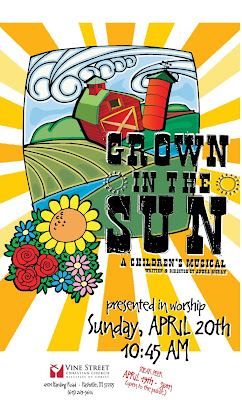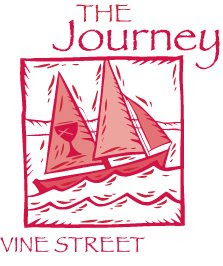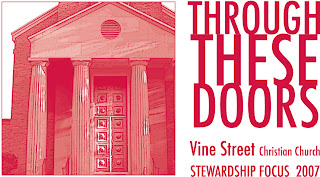Growing up I knew only one of my grandfathers, and he died when I was a teenager. It was then that I began developing a wise habit—I started adopting grandpas. Whenever I met an old man who impressed me in some way, I made him my adoptive grandpa.
One of the most recent ones was Studs Terkel, who taught me a lot about the people of the United States after I arrived here in the mid-90’s. Studs Terkel died on Friday, he was 96 years old.
Terkel was a radio man and a master interviewer; he knew how to listen so people would talk. He once recalled a moment that was typical:
There was this black woman one time, I saw her standing in the street with two or three of her kids round her and she was looking in a shopwindow. And as I’m walking by, I look to see what it is she’s looking at—and you know what? There’s nothing in the window, she’s looking in an empty shopwindow—looking at nothing. So naturally I’m curious—naturally I’m curious—so I say “Excuse me ma’am—but what are you looking at?” She doesn’t seem to mind being spoken to by a stranger, and she doesn’t turn her head around to see who’s asking her or anything, and after a moment or so she says “Oh” she says, “Oh, dreams, I’m just looking at dreams.” So I’ve got my tape recorder and I switch it on and I say “Good dreams, bad dreams . . . .?” And she starts to talk. Then she talks a little bit more, and a little bit more. And her kids are playing around her, and they can see I’m tape-recording what their mom is saying, and when she stops talking after eight, maybe ten minutes or so, one of them says “Heh mom, can we listen to what you said?” And I ask her if it’s OK with her and she says yes, so I play it back and she listens to it too. And when it’s over, she gives a little shake of her head and she looks at me, and she says “Well until I heard that, I never knew I felt that way.”
After a brief moment Terkel added,
“I never knew I felt that way.” Isn’t that incredible? The way I look at it, it’s like being a gold prospector. You find this precious metal in people when you least expect it [see Tony Parker, Studs Terkel: A Life in Words (New York: Henry Holt, 1996), pp. 167-168].
Terkel found plenty of gold; for nearly half a century, he crisscrossed the country interviewing people, both the prominent and the uncelebrated. Many of his conversations were published in books such as Working, Hard Times and The Good War for which he received the Pulitzer Prize—the stories of ordinary people about their daily work, their memories of the Depression and of World War II.
Terkel often referred to the United States as the United States of Alzheimer’s, and he recorded these conversations to help jog the nation’s memory. He wrote a dozen or so of these interview collections, chronicling much of the history of the 20th century—always interested in the lives of ordinary people, always asking “What is it like to be a certain kind of person, at a certain circumstance, at a certain time?” He could also see the irony in becoming celebrated for celebrating the uncelebrated people of the world, building himself a world reputation for giving voice to the voices of those we never hear.
Studs Terkel died on All Hollows’ Eve, the day before the church honors the saints. I wonder if he knew that the church had two days to celebrate the memory of the dead, first All Saints, when we remember those who have gone before us and who already see God face to face, and a day later, All Souls, when we remember all who have died. Without a doubt, he would have found it telling that the church saw a need to imagine heaven like boarding an airplane: early boarding for the saints who enjoy the comforts of wider seats, extra leg room, and free cocktails, while the rest are still sitting on their luggage, waiting for their rows to be called.
Some of the earliest books written and published in the church, were the lives of martyrs and saints, short biographies of men and women who lived what many considered exemplary lives of faith. But no one ever sat down to collect the stories of ordinary Christians, stories about what it was like to be a follower of Jesus at a certain circumstance, at a certain time.
Do you remember asking your parents or grandparents “What was it like when you were little?” Do you remember their stories about one-room schools, or the first family car, and watching baseball on the radio? Do you remember how wonderful it was to hear and suddenly realize that your parents—these all-powerful, all-knowing giants—once were little too? Nobody does better interviews than little girls taking a walk with their grandpa or little boys spending the night with grandma.
I have long hoped that the church would make interviews part of our discipleship training. First I imagined 12-year-olds armed with tape recorders invading homes and nursing homes and asking our oldest members “What was it like when you were baptized?” Then the prices for digital cameras began to drop – can you imagine the interview Clare would do with Risley , or Thompson with Mary Helen , and you could watch it on DVD?
And there’s no reason to limit this to just two generations. Every new Deacon should grab a camera, meet with a seasoned Elder, and ask “Can you tell me about a time when you failed as a leader and what you learned from it?” The Deacons would have a year’s worth of conversation starters about Christian leadership, and believe me, some of these interviews would become classics.
Studs Terkel mastered the journalistic art of interviewing ordinary people, and we can learn from him how to look for gold in the gravel of their daily life and sometimes daily struggle.
All Saints is not the church equivalent to the Oscars or the CMA Awards where superior performance is recognized and honored, nor is it the heavenly reflection of human societies where some always travel first class and the rest sit in coach or handle the luggage. All Saints is a day to remember that heaven is not a Discipleship Hall of Fame for the top athletes of the game; heaven is full of ordinary people. All Saints is a reminder that in the kingdom, every story, every life matters and no one is ever forgotten.
At the beginning of the Sermon on the Mount, Jesus sets the tone for all his teachings with nine beatitudes. Before a single instruction is given, before there has been time for obedience or disobedience, success or failure, Jesus declares God’s favor for the poor in spirit, those who mourn, the meek and the hungry, the merciful and the peacemakers, the pure in heart and those persecuted for the sake of righteousness.
He doesn’t list conditions those who would enter would have to fulfill, making poverty of spirit a requirement and meekness a precondition. Instead he assures us that God’s favor precedes all our efforts of doing God’s will, and that his path of meekness and mercy is indeed God’s path of peace. We walk in this path under the blessing of God and we struggle to remain true to this path under the blessing of God.
What Jesus declares here are not nine basic observations about life that others had simply overlooked. You know that meekness is not a recipe for worldly success, and that those who hunger and thirst for righteousness often go to bed hungry. Jesus reminds his followers that those who live in anticipation of God’s kingdom and who struggle daily with embodying that reign in their work and their relationships, are indeed God’s own people. Like their king, they are gentle and humble in heart (Matthew 11:19), and the powers that be will not always deal gently with them. They may look like fools in a world that plays by its own rules, but Jesus declares them blessed because the path they are on leads to God’s future. And on that day it will be the meek who inherit the earth, not the ruthless.
Blessed are those who mourn, who do not resign themselves to the present condition of the world as final, but lament the fact that God’s kingdom has not yet come and God’s will is not yet done—they will be comforted.
Blessed are ordinary people who get up in the morning and go to work in a dog-eat-dog world looking for opportunities to disrupt bad patterns with random acts of mercy, for they are God’s own people.
Blessed are ordinary people who do what they can to make peace at home, in the hallways of their school, and in the break room at work, for they will be called sons and daughters of God.
Blessed are ordinary people for whom faith is not one more thing to do, but the one thing that helps them put everything else in perspective, for theirs is the kingdom of heaven.
Blessed are ordinary people who refuse to be defined by how much they earn or how little, how much they have accumulated or accomplished or how little, or how much power they wield or how little, ordinary people who are solely defined by how much they are loved by God—they will see God face to face.
Heaven is full of ordinary people with extraordinary stories.




